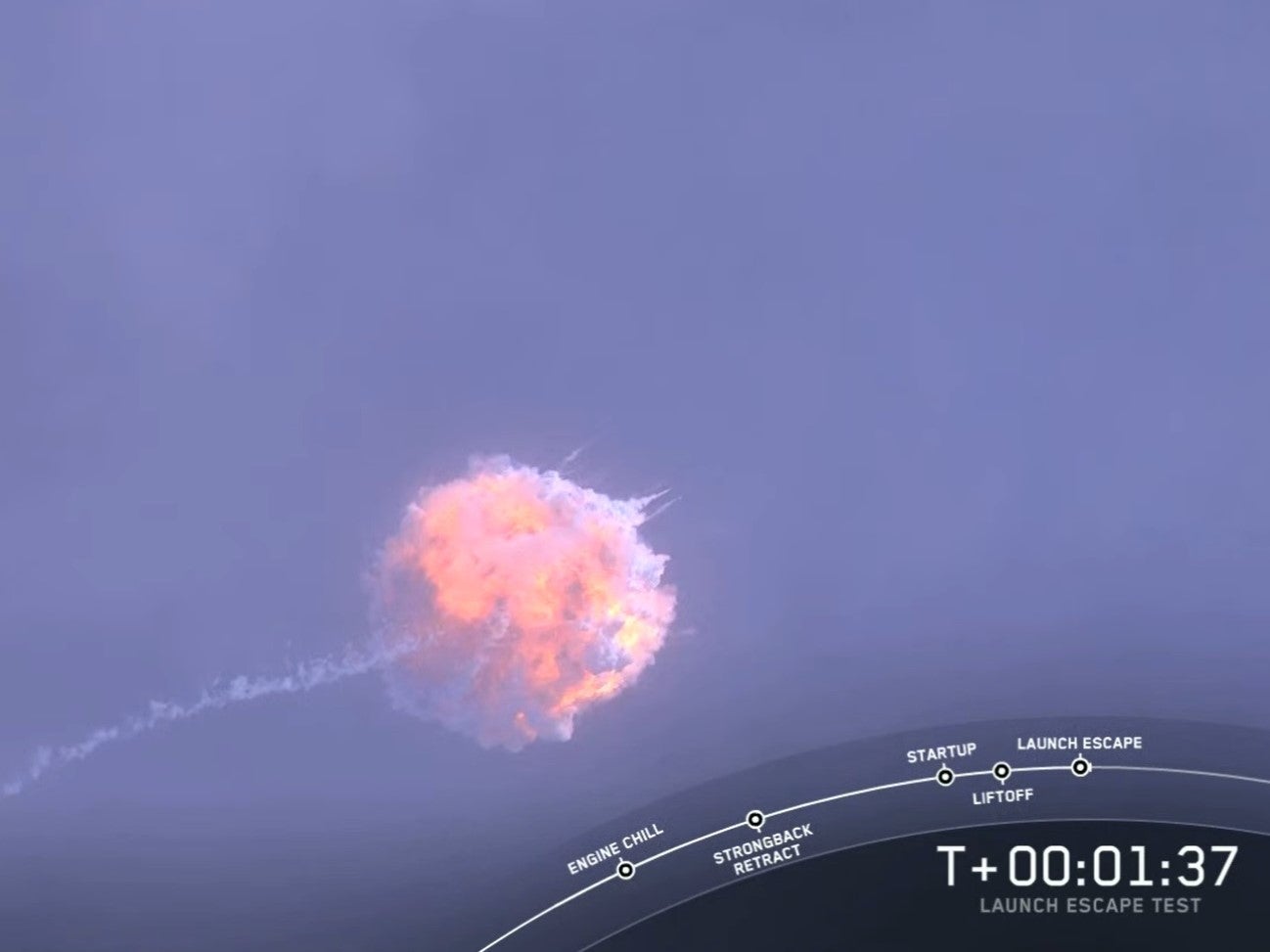This website uses cookies so that we can provide you with the best user experience possible. Cookie information is stored in your browser and performs functions such as recognising you when you return to our website and helping our team to understand which sections of the website you find most interesting and useful.

A 500-tonne rocket travelling 1,000mph has exploded over the Atlantic Ocean as part of a SpaceX safety test.
The Falcon 9 rocket performed a rehearsal of a “rapid, unscheduled disassembly” shortly after taking off from the Complex 39A launch site at Kennedy Space Center in Florida on Sunday.
The successful In-flight Abort Test was designed to demonstrate the private space firm’s ability to carry astronauts to safety in the event of a catastrophic failure during its ascent.
Follow live coverage of SpaceX launch
Shortly before the explosion, a Crew Dragon capsule safely detached from the rocket and parachuted into the ocean.
No crew were onboard, though the test now paves the way for the first astronauts to be taken to the International Space Station (ISS) using a SpaceX spacecraft.
The explosion took place less than two minutes after the launch. Within 10 minutes, the Crew Dragon capsule splashed down around 32km off-shore.
SpaceX CEO Elon Musk described it as a “risky mission... pushing the envelope in so many ways”.
He added: “I’m super fired up this is great. I’m looking forward to the next steps.”
The first crewed launch could be as soon as April, he said.
Created with Sketch.
Created with Sketch.
1/15
Space X Dragon departs from the International Space Station and heads for earth
AP
2/15
Space X Dragon undocks from the International Space Station
NASA
3/15
SpaceX Crew Dragon is pictured about 20 meters (66 feet) away from the International Space Station
Nasa/AP
4/15
A SpaceX Falcon 9 rocket, carrying the Crew Dragon spacecraft, lifts off on March 2 2019
Reuters
5/15
Astronauts aboard the Space Station preparing to open hatchet to the SpaceX Dragon capsule carrying a instrumented dummy after it successfully docked with Space Station
Nasa TV/EPA
6/15
A dummy(L) named Ripley onboard a SpaceX Falcon 9 rocket with the company's Crew Dragon spacecraft onboard after the opening of the hatch during the Demo-1 missioN
Nasa TV/AP
7/15
The SpaceX team watches as the SpaceX Crew Dragon docks with the International Space Station
Nasa/AP
8/15
SpaceX Falcon 9 rocket docked with the International Space Station during the Demo-1 mission
Nasa/AFP/Getty
9/15
A SpaceX Falcon 9 rocket, carrying the Crew Dragon spacecraft
Reuters
10/15
Astronaut David Saint-Jacques taking a look inside the SpaceX Dragon capsule carrying a instrumented dummy
Nasa TV/EPA
11/15
A SpaceX Falcon 9 rocket, carrying the Crew Dragon spacecraft lifts off on an uncrewed test flight
Reuters
12/15
A SpaceX Falcon 9 rocket, carrying the Crew Dragon spacecraft, lifts off on an uncrewed test flight
Reuters
13/15
A SpaceX Falcon 9 rocket with a demo Crew Dragon spacecraft on an uncrewed test flight
AP
14/15
SpaceX's new crew capsule approaches just before docking
Nasa TV/AP
15/15
Astronaut Eric Boe, assistant to the chief of the astronaut office for commercial crew, left, and Norm Knight, deputy director of flight operations at Nasa's Johnson Space Center watch the launch of a SpaceX Falcon 9 rocket carrying the company's Crew Dragon spacecraft
Nasa/AP
1/15
Space X Dragon departs from the International Space Station and heads for earth
AP
2/15
Space X Dragon undocks from the International Space Station
NASA
3/15
SpaceX Crew Dragon is pictured about 20 meters (66 feet) away from the International Space Station
Nasa/AP
4/15
A SpaceX Falcon 9 rocket, carrying the Crew Dragon spacecraft, lifts off on March 2 2019
Reuters
5/15
Astronauts aboard the Space Station preparing to open hatchet to the SpaceX Dragon capsule carrying a instrumented dummy after it successfully docked with Space Station
Nasa TV/EPA
6/15
A dummy(L) named Ripley onboard a SpaceX Falcon 9 rocket with the company's Crew Dragon spacecraft onboard after the opening of the hatch during the Demo-1 missioN
Nasa TV/AP
7/15
The SpaceX team watches as the SpaceX Crew Dragon docks with the International Space Station
Nasa/AP
8/15
SpaceX Falcon 9 rocket docked with the International Space Station during the Demo-1 mission
Nasa/AFP/Getty
9/15
A SpaceX Falcon 9 rocket, carrying the Crew Dragon spacecraft
Reuters
10/15
Astronaut David Saint-Jacques taking a look inside the SpaceX Dragon capsule carrying a instrumented dummy
Nasa TV/EPA
11/15
A SpaceX Falcon 9 rocket, carrying the Crew Dragon spacecraft lifts off on an uncrewed test flight
Reuters
12/15
A SpaceX Falcon 9 rocket, carrying the Crew Dragon spacecraft, lifts off on an uncrewed test flight
Reuters
13/15
A SpaceX Falcon 9 rocket with a demo Crew Dragon spacecraft on an uncrewed test flight
AP
14/15
SpaceX's new crew capsule approaches just before docking
Nasa TV/AP
15/15
Astronaut Eric Boe, assistant to the chief of the astronaut office for commercial crew, left, and Norm Knight, deputy director of flight operations at Nasa's Johnson Space Center watch the launch of a SpaceX Falcon 9 rocket carrying the company's Crew Dragon spacecraft
Nasa/AP
SpaceX described its Crew Dragon spacecraft as “one of the safest human spaceflight systems ever built” and plans to take not only astronauts but also civilians into space over the next few years.
Mr Musk has previously stated that his eventual aim is to colonise Mars using SpaceX craft.



 Africana55 Radio
Africana55 Radio 

